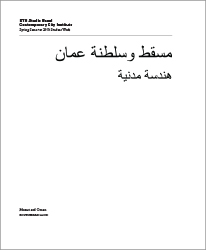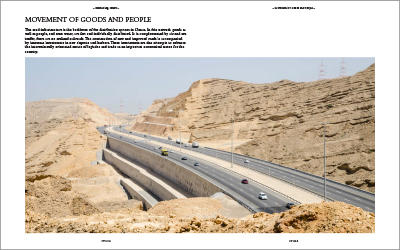Muscat and Oman - Engineered Land

Professors: Roger Diener, Marcel Meili
Assistants: Mathias Gunz, Vesna Jovanovic, Liisa Gunnarsson, Christian Müller Inderbitzin
In collaboration with the German University of Technology in Oman (GUtech)
Asst. Prof. Aurel Freiherr von Richthofen, Asst. Prof. Dr. Marike Botenbal, Prof. Dr. Sonja Nebel (TU-Berlin), Prof. Jurgen Werner, Amjaad Al-Hinai, Lorna Nairn, Hamad Al Gharibi, Frank Heinrich Eisenmann, Dr. Wolfgang Scholz, Daniela Angela Ottmann
Sami Al Habsi, Safaa Al Shukairy, Fatma Al Harrasi, Hawa Al Harrasi, Yomna Mohamed, Meriam Osman, Aya Al Balushi, Amna Al Sharji, Nadeen Al Tall, Hamed Al Brashdi, Alisraa Saadi, Tasnim Al Nasseri, Murooj Al Bu- lushi, Azhar Al Shukeili, Siham Al-Mabasali, Yasir Al-Otbi, Maram Al-Balushi, Aseel Elagib, Suleiman Al-Harshy, Habiba Al-Shaqsi, Nujiada Al Maskari, Nufu Al Maskari, Saima Akhtar, Nasir Mamun, Shaharin Hassain, Jokhha Harthy, Areej Zadjali, Flavia Mendes
Many thanks to our local friends and collaborators: Rumaitha Al Busaidi (Environmentalist), Nasser Al Azri (Environmental Expert), Saba Al Busaidi (Engineer and Entrepreneur), Maryam Ghalib Al-Alawi (Social Media Entrepreneur), Ass. Prof. Slim Zekri (Dept. of Natural Resource Economics, Sultan Qaboos University), Prof. Mohamed Alaa Mandour (Dept.of Civil and Architectural Engineering, SQU), Tia Harsha Pravin Kansara (Regional Sustainability Expert), Prof. Yasser Elsheshtawy (University of Al Ain, UAE), David Stratford and Kevin Abbott (VP and Management, The Wave), Prof. Anette Gangler (University of Stuttgart)
Graphic Designer: Absolut Agentur, St. Gallen
Editorial Supervisors: Liisa Gunnarsson, Vesna Jovanovic
Editorial Assistant: Audrey Mondoux
Druckerei Weber GmbH & Co., Lörrach.
Published by ETH Studio Basel: Contemporary City Institute, Basel 2015

Economies evolving from a fairly recent ability to exploit and globally place their natural resources have catalyzed urban exodus in many parts of the world. In the Arab Gulf, this is resulting in a vast territorial appropriation of formerly unsettled, mostly desert, land. As a country with a long history of global trade relations, the rapid development in Oman is ocurring concurent to preexisting settlement forms, which tradionally formed structures in absolute balance to the presence of water. A seamless and silent urban drive of a wealth gained on oil confronts this previous layer almost diagrammattically, this image impresses and confounds at the same time. How will this urbanization evolve and sustain itself on an unsustainable resource? What will it become, what permanence is created, and could Oman talk about balance and self-sufficiency based on itself alone? This report is part of our previous research in Switzerland (1999-2005), the Nile Valley (2009), Rome - The Adriatic (2010), Florida (2011) and in Vietnam (2012). These studies have clearly shown ways in which densely populated environments invent new types of spaces: traditional, natural, or rural areas turn into urbanized territories characterized by a multilayered occupation of landscape, overlapping structures and meanings. Crucial for this research was a joint two-week expedition to Oman, concentrated on the Muscat area.

